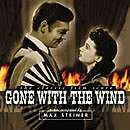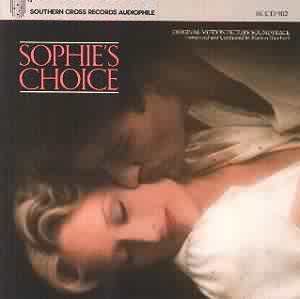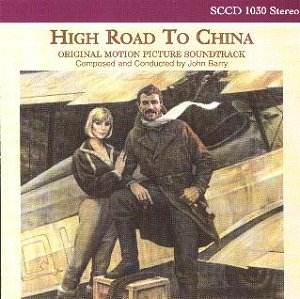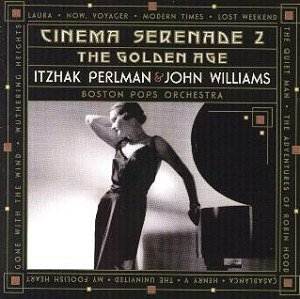
Film Music Editor: Ian Lace |
||
 |
September 1999 Film Music CD
Reviews |
|
![]() COMPETITION WIN
a CD of your Choice
COMPETITION WIN
a CD of your Choice
![]()
Return to the September (2) Index
Collection: Alfred Hitchcock 100 Years - A Bernard HERRMANN film score tribute MILAN 73138 35884-2 [31:33]

This compilation comprises reissues from Bernard Herrmann Film Scores 1993 Milan 74321 14081-2:-
Bernard Herrmann talking about film music
Psycho- Suite
Vertigo - Scene d'Amour
The Man Who Knew Too Much - Canata - The Storm Clouds (Arthur Benjamin)
North by Northwest - Prelude
The Wrong Man - Prelude
Plus a remix of Psycho murder music as used in the 1998 remake of the film
The Milan album of the film music of Bernard Herrmann released in 1993 (is it as long ago as that?!) drew praise from the critics including myself (writing of it in Classic CD). It included music for Citizen Kane, The Devil and Daniel Webster, Fahrenheit 451, The Bride Wore Black and Taxi Driver as well as the Hitchcock items. Now, Milan have cunningly clipped all the Hitchcock scores and gathered them on this rather parsimonious release. To be fair, they have remixed the tracks so that they sound even better than before. The performances are first class and it is good to have Arthur Benjamin's Storm Clouds Cantata that was used to such dramatic effect in the Albert Hall climax of The Man Who Knew Too Much. I think, too, that this is one of my favourite versions of the 'Scène d'Amour' from Vertigo. It unfolds very leisurely but it has great refinement and beauty. The only new track is the quirky synth effected (or should I say affected) remix of the Psycho murder associated with the recent awful remake of the film. At the bargain price, this album is worth acquiring. My advice, however, is to seek out a copy of the original Milan release which is still available (catalogue number (UK) 73421 14081-2 (US) 73138-35643-2).
Reviewer
Ian Lace

Bernard HERRMANN Jason and the Argonauts Bruce Broughton conducts the Sinfonia of London
INTRADA MAF7083 [61:33]

Jason and the Argonauts (1963) marked the fourth, and arguably the best, of the collaborations between fantasy films producer Charles Schneer and Bernard Herrmann who composed to the wondrous special effects of Ray Harryhausen. [The others were: The Seventh Voyage of Sinbad (1958); The Three Worlds of Gulliver (1960); and Mysterious Island (1961).] This is the world premiere recording of the whole score.
Herrmann, as usual, creates striking, evocative sonic images and brilliant colours by using extraordinary combinations of instruments. For Jason and the Argonauts he chooses to ignore strings altogether. On the other hand, he expands the winds and percussion to a massively huge ensemble. In most cases he triples or quadruples the instrumental requirements over the standard symphony orchestra. Standard pairs of woodwinds are increased to: 4 flutes and piccolos, 6 oboes, 6 cor anglais, 6 clarinets, including bass and contrabass clarinets, and 6 bassoons including contra-bassoons. The mammoth brass section has 8 French horns, 6 trumpets, 6 trombones and 4 tubas!
The immense battery of percussion has 26+ instruments plus 2 complete groups of 5 timpani each. The cymbals alone feature: 4 suspended cymbals, 2 separate pairs of large crash cymbals plus 1 large tam-tam and 1 medium tam-tam! For these instruments, Herrmann wrote music that explored the extreme compasses of the range of many of them, giving an impressive top-to-bottom, and wide dynamic range. He also organised the music so that it filled a wide and deep sonic stage. (Even though the soundtrack was mixed down to mono.)
I have asked the question before, but I will pose it again; however did Herrmann imagine these effects and calculate the forces to interpret them?
The score begins very powerfully with the exuberant and muscular 'Jason Prelude' that introduces the heroic Argonauts theme complete with crashing cymbals and strident brass. In the following cue, 'The Prophesy/The Battle', Herrmann creates an atmosphere of foreboding with a creepy choir of six bassoons with occasional striking harp arpeggio figures. (Throughout Herrmann's writing for the harp is extremely creative and evocative). The battle is marked by very striking, rapid-fire rhythms alternating between horns and bassoons. Herrman creates some exotic dance music in 'The Feast' and later in 'Temple dance' the latter very much in the style of the sensuous Egyptian dancing. The quiet, intense music associated with 'The Oak Grove and Hermes ascension is also impressive with flute and harp prominent.
It is, of course, the music associated with the monsters that Jason encounters which lingers in the memory. The first of these is the metal giant Talos. His might is represented by a pounding four-note figure in minor thirds, hammered out by all the tubas and both sets of timpani. This pounding intensifies to a monstrous (controlled) cacophony as Talos lifts the Argonauts boat and shakes it. For the harpies, the winged monsters, Herrmann creates appropriately screeching music played by the piccolos with brass and harps jabbing away in support. For the huge figure of Triton, who rises from the sea to push apart the "clashing rocks", Herrmann uses the whole range of his symphonic winds from low tuba to high picolo, to convey Triton's might, the surging waters and the creaking rocks. The scoring for the multi-headed Hydra, is particularly dense and jagged with the music rising and falling as the combatants strike at each other. Finally, there is the famous attack of the skeletons. Here Herrmann uses woodblocks and castanets to great menacing effect.
The Sinfonia of London are in top form and Bruce Broughton delivers a reading that would surely have had Herrmann applauding enthusiastically.
Reviewer
Ian Lace

Max Steiner Gone with the Wind (with bonus tracks)
Sonic Images SID8088 [65.13]

Gone with the Wind almost needs no review, for who hasn't seen the movie and been swept away by the magnificent theme for Tara? Max Steiner's Gone with the Wind is one of the most celebrated icons of film music, alongside Star Wars and Psycho. The music defines the concept of an "epic" score: supreme strings, resounding brass, colorful layers, large orchestra, and a spacious panoramic canvas. Steiner used the leitmotif method to write an individual theme for each main character, saving the grandest one of all for Tara, the plantation. The score is a tapestry of themes for Scarlett, Rhett, Melanie, Ashley, Belle, Bonnie, as well as music for specific scenes such as "The Oath," and "Bonnie's Death."
The popularity of the score meant numerous re-recordings over time. The Sonic Images release is the 1998 digitally mastered version of the 1961 composer-approved recording conducted by Muir Matheson with the The London Sinfonia. The liner notes comment, "This authentic recording of the complete score was authorized by the composer." Max Steiner had originally written over three hours of music for the lengthy epic, though not all of it was used in the film. Although 148 minutes of the score is available in a 2 CD set released by Rhino Records, Steiner had originally selected about 38 minutes of music to represent the score's major themes for soundtrack release. It is these 38 minutes that are on this album. Die hard collectors may prefer the longer complete score, but in truth, the 38 suite Steiner wisely chose allows listeners to enjoy all the major themes and developments of the score in a rather reasonable amount of time. (There is another BMG/RCA release that is about eight minutes shorter. It has all the same tracks, except for the theme for "Return to Tara" and "Belle Watling.")
The quality of the sound on this album is commendable. The only drawback of the album is that the score suite is divided into only 2 tracks. The score flows smoothly, and without track pauses, it is rather hard to identify where one motif ends and the next begins. Of course, it also makes it hard for the listener to skip to hear a particular theme or the monumental "Return to Tara" finale over and over again.
There are six additional tracks of classic film music representing five scores (America, America; For Whom the Bell Tolls; Spellbound; The Cardinal; and The Prime of Miss Jean Brodie) tacked onto the end of this album. These excerpts are sensational. Quite in keeping with the same mood and style of Gone with the Wind, these cues are prodigious and eloquent. Classic film music fans get to keep yet more keepsakes of golden years past.
Reviewer
Helen San

We are grateful to Helen San (www.cinemusic.net) for giving us permission to include this review which is currently appearing on her Film Music site.
Hans Zimmer Music Inspired by the Film K2 Varèse Sarabande Records VSD-5354 [41.22]

K2 was initially scored by Chaz Jenkel, whose music can be heard in the US versions of the film. Zimmer was asked to rescore it. However, the picture underwent so many changes that Zimmer's score ended up in the European versions only. To their credit, Varèse Sarabande released the score that Zimmer wrote for K2, even though the music did not become associated with the picture for most of its audience.
K2 was one of the earliest scores in which Zimmer explored the heavy action sythesizer sound that came to be dubbed "Zimmerian." This sound, more widely heard in Broken Arrow and Drop Zone, is usually accented with strident electric guitar played by Pete Haycock, which film music fans find either very passionate or very annoying. K2 falls into this stylistic category, except the guitar has more dramatic expressions, and the score moves with the smoldering, brooding twist that is later developed in Crimson Tide and The Fan.
The movie is about an unforgiving climb to the top of the second highest mountain in the world, K2, and the music takes the listener through the imagined highs and lows of the journey, building on prior experience but never returning to the same place. If anyone ever wanted to tell a vivid story about a mountain climb with music, this would be it. Every emotion anticipated on a rigorous feat as this, from apprehension to awe to sorrow, is perfectly captured. Flowing from mood to mood, and melody to melody, without any specific thematic structure, this album is in many ways more artistic and unrestrained than other scores, sounding somewhat like Zimmerian jazz if you will. There are so many melodic highlights that it is tempting to put up numerous audio clips to share the experience.
The album has only two tracks, "The Ascent" and "The Descent." "The Ascent," almost 30 minutes long, travels from base camp with Asian ethnic flourishes to rigorous suspensions from precipitous edges , to awakening wonder at the apex. Just when you thought this was a muscular, heroic score, "The Ascent" closes with a lustrous, melting movement performed with cello and viola that caresses the listener with tears. Following the same elegaic mood, "The Descent" begins with a weighty, tragic cue that sounds like an avalanche of grief. This track has some of the most passionately mournful expressions I have ever heard Zimmer write. The music here is truly beautiful in a panoramic way. The sadness takes time to reflect and mature, in a way that a 30 second audio clip could never capture. The score ends with poignant, romantic guitar themes.
Many people complain about the length of the two tracks, but after a few discerning listens, it becomes understandable why the music was not chopped up. This is a story told in two chapters, and the listening experience is best when the story is followed and savored from beginning to end.
Helen San

We are grateful to Helen San (www.cinemusic.net) for giving us permission to include this review which is currently appearing on her Film Music site.
************************************************************** EDITOR’S RECOMMENDATION– September 1999
**************************************************************
Marvin HAMLISCH Sophie's Choice Southern Cross SCCD 902 [31:32]

Did she ultimately make the right choice to save herself ? Book and film offer 2 answers. Hamlisch's score would have you at least assured that spiritually she found salvation. The ever-present 6 note "Love Theme" is a rich melody more often for wind ensemble than strings. It's constant use ties together the heartache and joy as one and the same thing. On this compact Compact Disc, there's just about enough of it without becoming over repetitive. It's also balanced by conflicting yet not distracting alternate styles or sourced tunes.
Mendelssohn's "Op. 30, No. 1" blends seamlessly, as do the traditional tunes woven into a couple of cues. The royal fanfare of "Coney Island Fun" may be the only thing that sounds out of place in context.
If you were moved by the film, be warned that the disc is likely to have the same effect!
Reviewer
Paul Tonks

an Lace is even more enthusiastic:-
Yes, indeed, this is music to tug at the heart strings. A wallow for unashamed romantics - and you may count me among those! Hamlisch is a multi-faceted talent composer, songwriter and conductor and multi-Oscar and Grammy Award winner. His hit shows include A Chorus Line and They're Playing Our Song. His film scores include: Ordinary People, The Way We Were, The Sting, and Three Men and a Baby. His hit songs include: 'The Way We Were', 'Nobody Does It Better' and 'What I did For Love'
Hamlisch's parents had fled from pre-war Vienna to New York. Their apartment became the meeting place for the city's finest classical musicians and Marvin studied at the Juilliard School of Music. His classical training is evident in the polish and depth of this score. There is a Handelian influence at work in 'Coney Island Fun' and a subtle influence of Dvorak in 'Nathan Returns.' There is also purity of classical line in a number of the cues such as 'Returning the Tray' a short elegy scored for just piano and cello. This pairing of piano and cello (an instrument that is particularly effective in suggesting autumnal, nostalgic moods and feelings of regret) is most affectingly used in the halting, almost prayer-like 'I'll never leave you'
The score for Sophie's Choice is beautifully crafted. The love theme which threads its way through this score and sets the prevailing mood is a gentle, lovely, warmly-glowing creation. I would mention just two cues. In the sumptuous 'Rite on the Brooklyn Bridge', the theme is given to the strings and Hamlisch fashions rich intricate textures. In 'Aren't Women All Like You' the music is almost ethereal with the flute floating over rapt string chords.
Highly recommended.
Reviewer
Ian Lace

John BARRY High Road To China Southern Cross SCCD 1030 [29:59]

For Selleck's first big screen outing, it's almost the Indiana Jones role he was up for. His scrapes and escapades as the alcoholic pilot Patrick could have inspired a rollicking action motif and score in the Williams style. Mr Barry knows how to draw something else out of a picture however. His "Main Title" is instead a hint of the tragedy of Bess Armstrong's lost father, Patrick's boozing, being lost in general (as they frequently are), and also suggests the free-spiritedness of flying.
Much of the score foreshadows the expansive outdoors feeling of Dances With Wolves, with the drums in "Airborne" loudly recalling "Dawn Attack". There is more 'bite' to the score than many of his post-eighties romantic pieces. With a small break for the "Charleston", there's also a spirit of humour in the music. It's all very sad, but being a movie, neither we nor Barry should take it seriously - of course everything will be fine in the end!
Reviewer
Paul Tonks

Collection: CINEMA SERENADE 2 The Golden Age Itzhak Perlman (violin); John Williams conducting the Boston Pops Orchestra
SONY SK 60773 [47:35]

David Raksin: Laura "Theme" (Arr. Angela Morley)
Max Steiner: Now Voyager "Theme" (Arr. John Williams)
Gone With the Wind "Tara's Theme" (Arr. Angela Morley)
Charlie Chaplin: Modern Times "Smile" (Arr. John Williams)
Miklós Rózsa: Lost Weekend "Love Theme" (Arr. John Williams)
Traditional: The Quiet Man "St. Patrick's Day" (Arr. Angela Morley)
Erich Wolfgang Korngold: The Adventures of Robin Hood "Love Theme"
(Arr. John Williams)
Herman Hupfield: Casablanca "AS Time Goes By" (Arr. John Williams)
William Walton: Henry V "Touch Her Soft Lips and Part"
(Arr. Richard Rodney Bennett)
Victor Young: The Uninvited "Stella by Starlight" (Arr. John Williams)
My Foolish Heart "Theme" (Arr. Angela Morley)
Alfred Newman: Wuthering Heights "Cathy's Theme" (Arr. Angela Morley)
Just the above list of the tracks ought to whet the appetite. Or a list of the composers represented. Or knowing it's Williams waving the baton. Or that Itzhak Perlman is leading the way. Combine all 4, and you should be positively drooling !
For a compilation such as this there's really very little to cover. The Boston Pops are of course superb - especially working with Williams. Perlman's performances of the arrangements are fabulous. The 24-bit recording is exemplary, with Perlman's violin miked generously.
You could never fault a single one of the pieces, so here's the list: Raksin's Laura, Steiner's Now, Voyager and Gone With The Wind, Chaplin's Modern Times, Rozsa's Lost Weekend, Korngold's Robin Hood, Walton's Henry V, Young's The Uninvited and My Foolish Heart, Hupfeld's Casablanca, and Newman's Wuthering Heights.
Actually, here's a gripe - we'll probably find these 2 volumes boxed at mid-price before long!
Reviewer
Paul Tonks

There are more >>>>>
Return to September index [Part 1] [Part 2] [Part 3]
COMPETITION WIN a CD of your Choice

Search the Crotchet database from here
Discs on these pages are offered for sale. There is also a page of search engines from a selection of on-line retailers here.
Please support this web-site by buying your discs here.
Disclaimer: Every effort is made to make sales links to the correct disc but, in the end, you must take responsibility for checking that what you are purchasing is what you want. Some of these discs were not actually available for sale at the time of posting but a link has been made in anticipation of their forthcoming availablility.
Return To Film Music on the Webe-mail: info@musicweb.uk.net